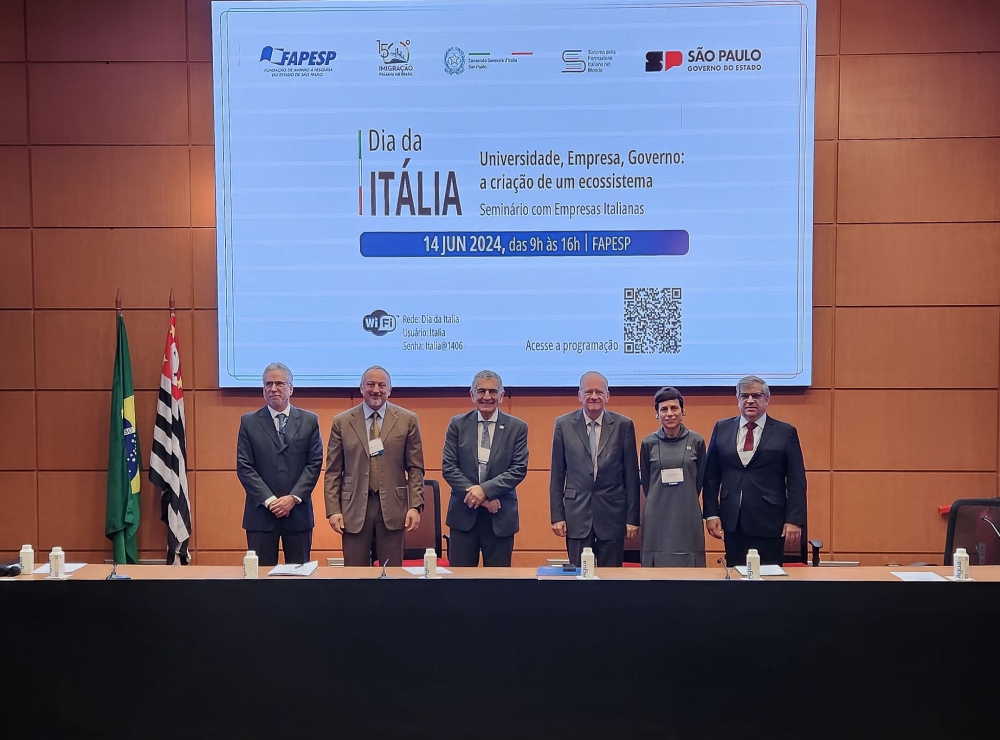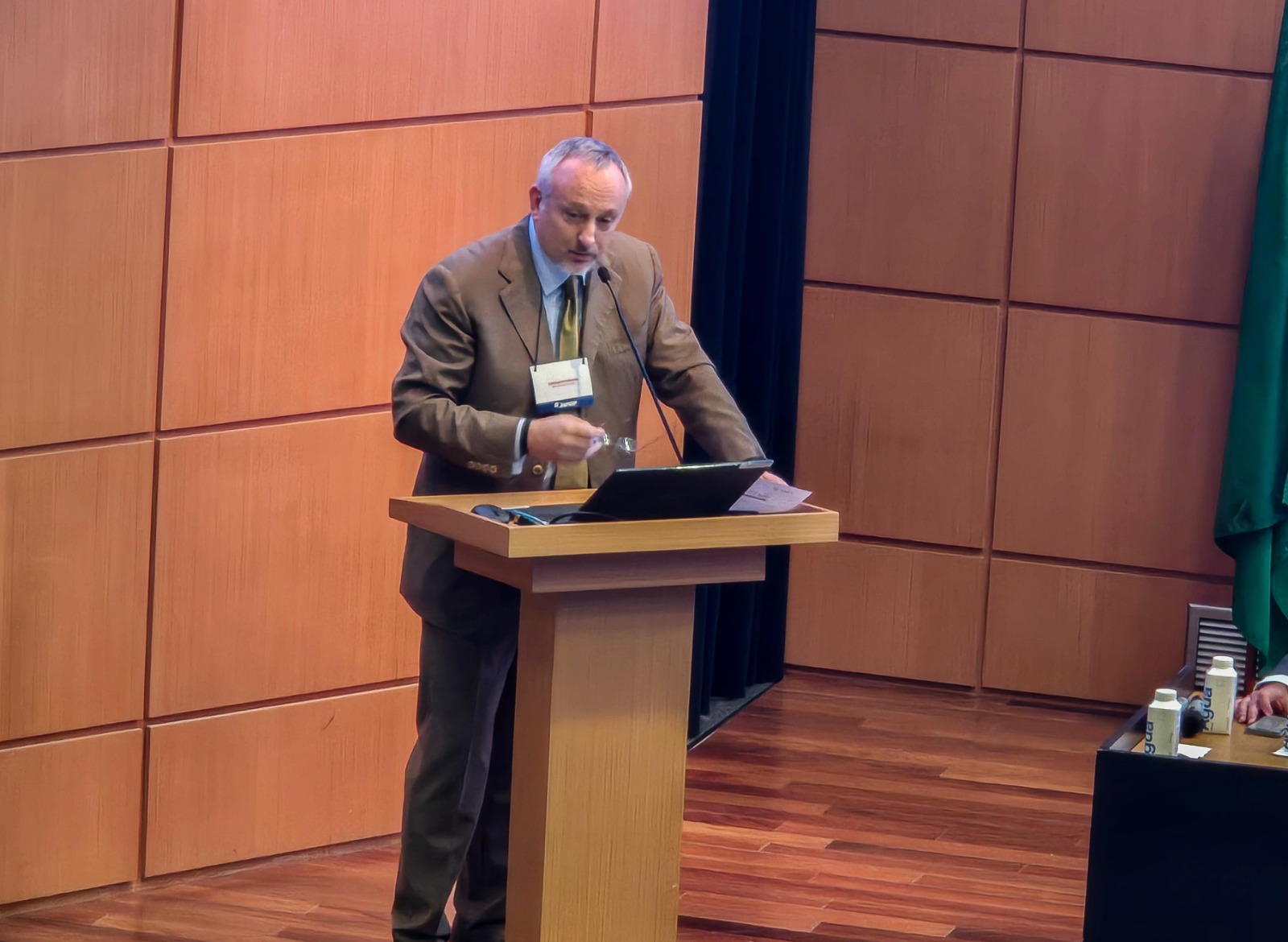

Marcio de Castro, Domenico Fornara, Vahan Agopyan, Marco Antonio Zago, Raiane Assumpção and Carlos Gilberto Carlotti Jr. (photo: Karina Toledo/Agência FAPESP)
Companies are currently involved in 15% of the collaborative research projects conducted by scientists in São Paulo state and Italy, according to data presented at an event hosted by FAPESP.
Companies are currently involved in 15% of the collaborative research projects conducted by scientists in São Paulo state and Italy, according to data presented at an event hosted by FAPESP.

Marcio de Castro, Domenico Fornara, Vahan Agopyan, Marco Antonio Zago, Raiane Assumpção and Carlos Gilberto Carlotti Jr. (photo: Karina Toledo/Agência FAPESP)
By Elton Alisson | Agência FAPESP – Companies are currently involved in 15% of the collaborative projects conducted by researchers in São Paulo state and Italy. To strengthen and increase interaction between researchers and Italian companies present in São Paulo, FAPESP held a seminar entitled “Italy Day: universities, companies, governments – creating an ecosystem” on June 14 as part of the commemorations of 150 years of Italian immigration in Brazil.
“We’re not just celebrating what we built in the past and our common roots, which of course are important, but also discussing what we need to do to invest more in bilateral trade. In this context, research and innovation in partnership with business are essential,” Domenico Fornara, Italian Consul General in São Paulo, told Agência FAPESP.
According to data presented at the event by Marco Antonio Zago, President of FAPESP, scientific and technological cooperation among universities, research institutions and Italian companies in São Paulo state has led to the publication of more than 200 scientific articles per year in the last three years.
“The impact of this production is of the highest quality. It is equivalent to 11 times the world average. Moreover, 19% of this production is cited in public reference documents published by the United Nations, the World Health Organization [WHO] and the Food and Agriculture Organization [FAO], among other institutions,” he said.
The Italian companies with the highest level of cooperation with researchers in São Paulo state operate in the health, energy and agricultural sectors. The goal is to loop in companies in other sectors. “We’re taking steps to extend cooperation to companies in technology, engineering and automotive, among other areas,” he said.
The areas with the most potential to increase interaction include sustainable transportation, the energy transition, artificial intelligence, information technology, life sciences, materials engineering and aerospace, Fornara noted, adding that 60% of the more than 1,000 Italian companies with a presence in Brazil are located in São Paulo state.

Domenico Fornara, Italian Consul General in São Paulo (photo: Concepta McManus/Agência FAPESP)
Tiremaker Pirelli, for example, has been in Brazil for 94 years and one of its largest plants worldwide is located in Campinas. “We’ve just unveiled two research laboratories, one for materials and the other for indoor innovation. In addition, we have an open research center on asphalt, where trials are conducted in partnership with automakers,” said Mário Batista, Vice President of Pirelli in Brazil.
The research lines Pirelli is currently pursuing include tires for electric cars, which are different from regular tires, as well as natural rubber and recycling of used tires, which are typically incinerated but can be used in asphalt and as fuel for power generation.
“This is a field that already exists and should be expanded via our collaboration with FAPESP, I believe. The potential for joint projects is considerable,” Batista said.
The energy transition and predicting extreme weather events are among the research lines Enel is interested in pursuing in partnership with Brazilian universities and research institutions, according to Guilherme Lencastre, President of Enel São Paulo.
“We must deal with climate change in order to improve forecasting, glean a better understanding of what’s happening, identify our most critical infrastructures and work out how to protect them. This is something we can do with academia, which has the best knowledge in the field. We mean to join forces,” Lencastre said.
Support instruments
The instruments available from FAPESP for funding research collaboration with Italian companies include programs such as the Applied Research Centers (ARCs), Research Partnership for Technological Innovation (PITE) and Innovative Research in Small Business (PIPE), said Eduardo Zancul, a member of FAPESP’s Research for Innovation Adjunct Panel.
“FAPESP supports academia-business research collaborations as well as applied research in which projects are designed to have medium- to long-term practical applications. These projects include the transfer of results to the companies involved. FAPESP does not hold intellectual property rights in these cases,” he explained.
The ARC program, for example, supports academia-business research collaborations in which companies present a technological challenge and a research center is set up to develop solutions over the long haul.
“These centers focus on complex problems and aim to solve them in a timeframe of ten years. The company and FAPESP co-fund the research,” Zancul said.
Twenty-seven ARCs are up and running, and have received investments exceeding BRL 570 million. They include the Center for Innovation in New Energies (CINE), established by FAPESP, Shell Brazil, the State University of Campinas (UNICAMP), the University of São Paulo (USP) and the Nuclear and Energy Research Institute (IPEN) in 2018.
Its mission is to produce knowledge at the research frontier and transfer technology to the corporate sector. Shell may use the results of the research to create startups or in partnerships with other companies.
“We have a recent partner, which is Itaú [Brazil’s largest private bank]. The first phase of the center resulted in almost 500 scientific publications, which obtained more than 5,000 citations, as well as several intellectual properties and some startups,” said Marcos Gonçalves Quiles, a professor at the Federal University of São Paulo (UNIFESP) and a researcher affiliated with CINE.
On the Italian side, a new bilateral executive protocol now being negotiated will be strategic to expand research collaboration between the two countries into other areas, according to Fornara.
The protocol calls for the implementation of a three-year program to support collaborative projects proposed by two research centers, one in Brazil and the other in Italy. The last edition of the program (2021-24) involved support for eight research projects on such topics as production of electricity and green hydrogen, and polymer nanotechnology for the treatment of vector-borne diseases.
“This is a very useful instrument that we have with our most important international partners in the innovation sector under the umbrella of the bilateral executive protocol we’re discussing for the period 2025-27. We’re in the process of choosing sectors,” Fornara said.
Brazil is Italy’s fifth most important academic partner in the world, according to Fabio Naro, scientific attaché to the Italian embassy in Brasília. “Italian universities have more partnerships with Brazil than with many European countries,” he said, stressing the country’s successful innovations in many fields.
“Italy is famous for the arts, fashion, food and cars, but we aren‘t sufficiently recognized and perceived as a country that’s the beating heart of innovation. We were the third country to put a satellite in orbit [after the Soviet Union and the United States]. Many companies and innovations have been born in Italy in the last 2,000 years,” he said.
The event was also attended by Vahan Agopyan, São Paulo State Secretary for Science, Technology and Innovation; Carlos Gilberto Carlotti Junior, Rector of USP; Raiane Patrícia Severino Assumpção, Rector of UNIFESP; Ana Beatriz Oliveira, Rector of the Federal University of São Carlos (UFSCar); Dácio Matheus, Rector of the Federal University of the ABC (UFABC); Marco Túlio Vasconcelos, Rector of Mackenzie Presbyterian University (UPM); Anderson Correia, Executive Director of the Technological Research Institute (IPT); Marcio de Castro Silva Filho, Scientific Director of FAPESP; Fernando Menezes, its Chief Administrative Officer; and Carmino Antonio de Souza, a member of its Board of Trustees.
Republish
The Agency FAPESP licenses news via Creative Commons (CC-BY-NC-ND) so that they can be republished free of charge and in a simple way by other digital or printed vehicles. Agência FAPESP must be credited as the source of the content being republished and the name of the reporter (if any) must be attributed. Using the HMTL button below allows compliance with these rules, detailed in Digital Republishing Policy FAPESP.





